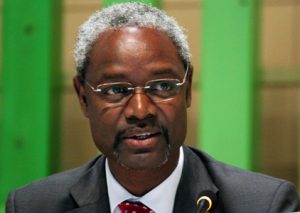Event
Discussion with newly appointed UNEP Deputy Executive Director

10 Oct 2013
13:00–14:00
Organization: Geneva Environment Network
A discussion on the United Nations Environment Assembly of UNEP (UNEA) with the newly appointed Deputy Executive Director of the United Nations Environment Programme, Ibrahim Thiaw, was organized by the Geneva Environment Network Secretariat at the International Environment House on Thursday 10 October 2013.
United Nations Secretary-General Ban Ki-moon appointed Ibrahim Thiaw as UNEP Deputy Executive Director in August 2013. Ibrahim joined UNEP’s Senior Management Team in 2007 as Director of the Division of Environmental Policy Implementation, spearheading UNEP’s ecosystem management sub-programme, which promotes an approach to natural resource management focusing on sustaining terrestrial, aquatic and marine ecosystems to meet both ecological and human needs. He also held the lead responsibility for UNEP’s Post Conflict and Disasters Management Subprogramme. Ibrahim led UNEP’s contribution to intergovernmental processes such as the United Nations Collaborative Programme on Reducing Emissions from Deforestation and Forest Degradation (UN-REDD) and the Intergovernmental Science-Policy Platform on Biodiversity and Ecosystem Services (IPBES).
Ibrahim began his career in the Ministry of Rural Development in Mauritania where he worked from 1983-1992 and played a key role in the development of Mauritania’s national environment institutions and policies. In 1992 he joined IUCN (International Union for Conservation of Nature) where he held a series of positions including in the Sahel Programme with subsequent appointment as Africa Coordinator, Regional Director – West Africa and prior to joining UNEP- as Acting Director-General of IUCN.
Agenda
12:45
Coffee & Tea, Light Sandwiches
13:00
Welcome and introduction
Jan DUSIK, acting Director, UNEP Regional Office for Europe
13:05
UNEP United Nations Environment Assembly of UNEP (UNEA)
Ibrahim THIAW, UNEP Deputy Executive Director and UN Assistant Secretary-General
13:30
Question-and-answer session
14:00
End
About UNEA
Pursuant to UNEP Governing Council decisions 27/2 and 27/15, as well as the series of informal consultations by the Committee of Permanent Representatives to UNEP and the subsequent decision by the Bureau of the United Nations Environment Assembly to UNEP (UNEA) on 27 May 2013, the UNEA will hold its first session in Nairobi from 23-27 June 2014. All Governments, as well as the chairs of the UNGA, ECOSOC and the CPR were notified through the letter by the Executive Director dated 7 June 2013. The formal notification by the Executive Director will be issued three months before the session.
In accordance with the customary practice, the informal consultations with the regional groups will be held on Sunday, 22 June 2014.
The UNEA should be preceded by the Global Major Groups and Stakeholders Forum on 19-20 June 2014. Additional pre-session events may be organized on topics that can contribute to the work of the UNEA.
UNEA Functions
UNEA is the main governing body of UNEP with the following functions:
- Setting the global environmental agenda;
- Providing overarching policy guidance and defining policy responses to address emerging environmental challenges;
- Undertaking policy review, dialogue and exchange of experiences;
- Setting the strategic guidance on the future direction of UNEP;
- Organizing a multi-stakeholder dialogue;
- Fostering partnerships for achieving environmental goals and resources mobilization.
Discussion
Following questions and remarks by France, Iran, New Zealand, UNEP colleagues, CITES, the Welands Convention, IISD and PEFC, Ibrahim Thiaw provided additional information on stakeholders engagement and civil society participation, the high-level segment, the possibility for various groups to have special events during UNEA, SDGs and indicators follow-up, financial contributions, wildlife traffick, the relations with newly formed High-level Political Forum (HLPF) and the recently reformed ECOSOC, UNEP reforms to reinforce its work in the regions, the terrorist attack in Nairobi and possible consequences on meetings scheduled in that region.
More information and documents
UNEP Governance Structure available for download from UNEP website.
UN Environmental Assembly of the UNEP website.
